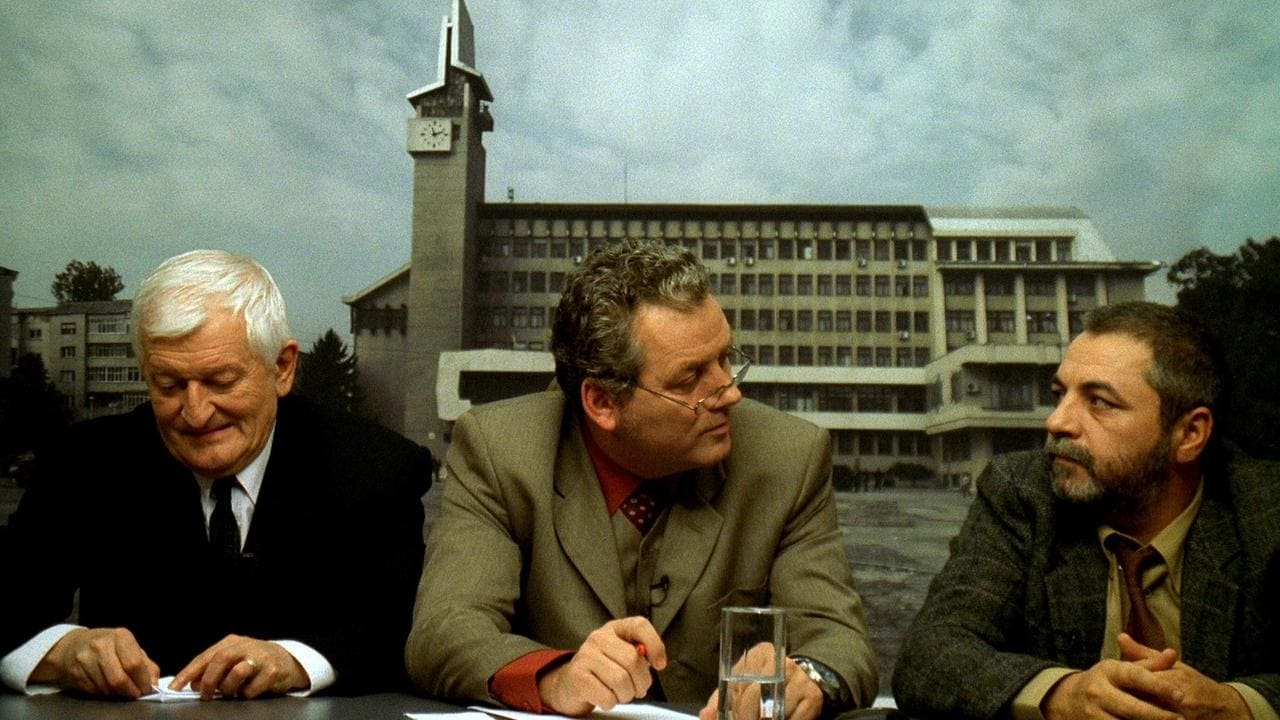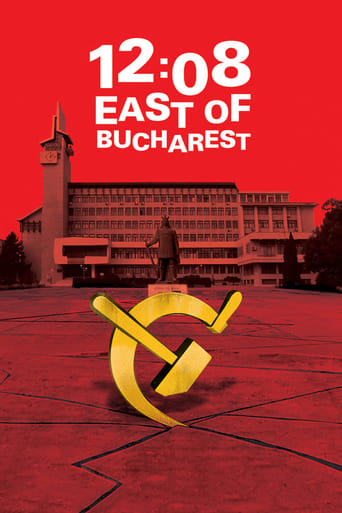

If you insist on something actually happening in a movie - on the characters developing as people, or engaging as conflict that produces some decision - this movie isn't for you. Of course, one of the points of satire is that people don't develop and issues don't get decided. But what indeed is being satirized here? I have my own opinions, but yours may differ.But I am pretty confident that writer/director Porumboiu made exactly the movie he intended to make and that it produces very much the effect he intends to get. In the course of a December day in a nameless small burg which culminates (if that is the word) in a "talking heads" TV broadcast on the 16th anniversary of the overthrow of Ceausescu, we learn something about the host and his two guests. We come to learn some weaknesses and strengths of each that we hadn't suspected at first. We smile a lot and laugh a few times. We are left feeling that "revolutions" are not always very effective, but that people are perhaps not a failed experiment.Take Jderescu, the host and ostensible protagonist. He starts off in the morning struggling to get the guests he wants, but after some unanswered calls he ends up settling for an old guy (Mr. Piscoci) whom he knows nothing about except that he remembers him playing Santa Claus when he was in school. It's rough work these days for a dedicated public affairs journalist! - if that's what he is, but by the end his image has frayed a bit.On the other hand, there is Manescu, the high school teacher who is a scheduled guest. He is no great example of teaching; he spends all his money on booze and has borrowed from everyone; he now has to borrow money from the Chinese store owner whom he plastered with racist insults when he was drunk the previous night. As the show opens, he claims to have been in the town square with three colleagues, now all dead or emigrated, staging a brave and lonely protest against Communism and being beaten by the Securitate before word came of the overthrow in Bucharest. But callers challenge this story and claim he wasn't there at all. But, a bit deflated but unbeaten, he sticks with the story. Whatever he did in 1989, in 2005 he holds out courageously.Piscoci, who is on the show pretty much by accident, makes hilariously deadpan and eccentric observations when he isn't folding origami boats out of boredom. Ultimately he is asked what he did on December 22, 1989, and it turns into a completely irrelevant but also very touching anecdote.The Romanian title translates as "Was there a revolution or not?" Jderescu turns this into a question of whether anyone fought the Securitate in this burg or whether they just celebrated the overthrow after word came from the capital. But here is what I think I think it really means, and what the movie is really satirizing. We see a shabby little city, where the school system is a joke, public affairs broadcasting is incompetent, and people who speak up (Manescu) are told to be quiet and threatened. (In this case, we are speaking of threats of libel suits from a now-rich-and-respectable Securitate man.) What does this remind you of? Isn't this exactly what you might have seen in a satire of bureaucratic Eastern Europe in the pre-1989 years? Does it look as if there has been much of a revolution at all in Romania, much less in this little city? Isn't everyone playing out much the same role now in 2005 that they were playing in 1989? That might seem as a very despairing observation, but it is handled with such a light and humorous and human touch here that it doesn't make you despair. Me, anyway. I'm very glad to have seen this movie.
... View MoreRomanian films are certainly where it's at. The past 5 years have thrown up simple yet engaging works unmatched by the majority of the world. They have the ability to comment on Romanian society, with a sense of dark humour and without being too preachy. 12:08 East from Bucharest tells of a small town and whether or not it had anything to do with the 1989 revolution. The film sets up it's three protagonists and the world they live in. It manages to use the small town setting to it's advantage as we get a lot of back-story through the townsfolk recollections of each other. Over half the film is a TV broadcast, making it almost static, given humorous life by an incompetent cameraman and his less than adequate tripods. Luckily the dialogue, bickering and mystery is enough to keep the audience fully entertained. It's amazing how brilliantly scripted dialogue can be more enthralling than car chases, explosions and slapstick. The cinematography is also beautiful, with an exceptional silent climax as the streetlights come alive at dusk.
... View More1st watched 1/23/2010 – 7 out of 10 (Dir-Corneliu Poromboiu): Funny and meaningful Romanian film about a few people in a small town east of Bucharest trying to recall the events of December 22nd, 1989 – the day Romania won a revolution against Communist control. This movie is wonderful more because of what it doesn't say then for what it does. A local talk show host invites some local folks to join him to talk about this day and whether there was a physical revolution in their town before the government was ousted at 12:08 PM. The movie starts as he's trying to gather his guests and we're introduced to the three principal characters in the story. One, a drunk school teacher – another an old man who occasionally dresses as Santa Claus for the local kids and of course, the host. They arrive together and the debate begins between the teacher, the callers and the host about his presence in the town square before the allotted time when the takeover occurred. He insists he was involved in a local revolution but all the callers debunk his recallings. The old man, doesn't have much to give, he's just there to express there was a gathering after 12:08 PM. The host, believes in the significance of this local revolution, but all in all there isn't much of one, really. It happened and that's really all that matters and there was change --- hence this is the point of the film. A quietly funny gem that let's you have time to think as well while viewing --which is definitely rare (especially in American films).
... View MoreDirector Porumboiu confesses to admiring the early work of Jim Jarmusch, but this feels as if it could have spun off from one idea in a Tati comedy. It is set in an un-named little town, somewhere east of Bucharest and built mostly of drab post-communist concrete. All of the exterior shots emphasise the drab modernity, in grainy near-monochrome. In contrast to this, the lives of the town's citizens are described almost as if they are living in a village, during the build-up to New Year; or as the subtitles have it, 'new year's'. The old man who regularly does a 'Santa', the school teacher who throws his earnings down his throat, the talk-show host desperately attempting to gather enough guests to discuss whether or not a revolution happened locally to coincide with the downfall of Ceaucescu, the kid who wants to be a video artist instead of gamely pointing the TV camera where he is told. The story introduces all these characters, giving them no obvious interconnection, until they are dropped into the TV studio with the added pressures of real time and occasional phone-in callers. It's here that the quiet, wry humour steps up a level, and with especially the creative use of the 'F' word gets the audience laughing out loud instead of smiling sadly. There's a kind of coda, taking a line from the interview about how street lights work and extending it into a metaphor, back in the grainy streets as darkness falls again, but dressed up for the season. If it were music, it might take its place beside the romantics, although it's perhaps closer in spirit to Zappa. Discuss!
... View More